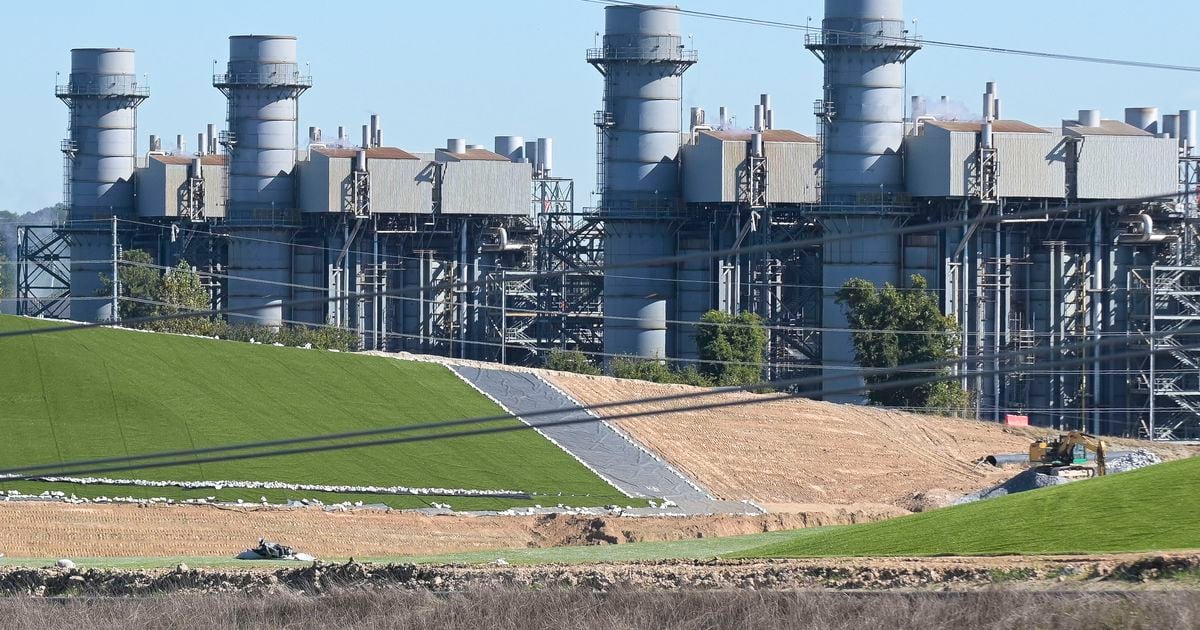Georgia seeks to scuttle new air pollution rules for power plants
Georgia seeks to scuttle new air pollution rules for power plants The Atlanta Journal Constitution



Republican-led States Challenge New Federal Regulations on Air Pollution from Power Plants
Twenty-five Republican-led states, including Georgia, have filed a legal challenge to new federal regulations on air pollution from power plants that generate electricity.
The new rule, announced in April, aims to phase out coal-burning for power in the U.S. over the next 15 years and make it significantly harder for utilities to continue using natural gas. Both coal and natural gas are non-renewable fossil fuels that contribute to climate change. Environmentalists have praised the rule, while utilities have criticized it.
Legal Challenge Filed
The appeal, filed with the D.C. Circuit Court of Appeals, is only about a page long and does not provide a detailed argument against the rule. It simply states that the rule is “arbitrary, capricious, an abuse of discretion, and not in accordance with law.”
The U.S. Environmental Protection Agency (EPA), which issued the rule, declined to comment on the legal challenge due to pending litigation.
Georgia Attorney General Chris Carr and Georgia Power, which recently received approval to add more fossil fuel-fired power generation to its fleet, did not immediately respond to requests for comment.
Concerns Raised by Georgia Attorney General
In a statement, Attorney General Carr expressed concerns about the new rule, stating that it includes costly and unattainable standards with unrealistic deadlines. He emphasized that Georgia’s economy depends on safe, reliable, and affordable energy, and that the state will not tolerate burdens imposed by activists in Washington D.C. Carr also referenced a recent U.S. Supreme Court ruling that limits the EPA’s authority to regulate greenhouse gas emissions.
“Our economy depends on safe, reliable and affordable energy, and we won’t stand by while D.C. activists further burden families and businesses throughout our state,” the statement said. It also referenced a recent ruling by the U.S. Supreme Court limiting the EPA’s ability to regulate greenhouse gas emissions.
Environmental Law Center Supports the Regulation
Gudrun Thompson, a senior attorney with the Southern Environmental Law Center, stated that the new regulation is legally sound and stands on firm footing. She criticized the state attorneys general for wasting taxpayer dollars on a meritless challenge instead of working towards implementing safeguards to protect communities from fossil fuel pollution.
New Rules and Stricter Regulations
The new rules require existing coal-fired plants and new natural gas-fired plants to control 90% of their carbon pollution by 2032. Regulations for existing gas-fired plants are still being developed.
In addition, the recent changes include stricter regulations on the handling of coal ash, a byproduct of burning coal that contains toxic heavy metals. Georgia Power and state regulators were already under scrutiny by the EPA for their plan to dispose of tons of coal ash in unlined ponds.
Additional Legal Challenges
Reuters reported that the states of Kansas and Ohio, as well as the National Rural Electric Cooperative Association, have also filed separate legal challenges to the EPA emissions rules. The National Rural Electric Cooperative Association represents about 900 local electrical co-ops, including some in Georgia.
A Note of Disclosure
This coverage is supported by a partnership with Green South Foundation and Journalism Funding Partners. You can learn more and support our climate reporting by donating at ajc.com/donate/climate/
SDGs, Targets, and Indicators Analysis
1. Which SDGs are addressed or connected to the issues highlighted in the article?
- SDG 7: Affordable and Clean Energy
- SDG 13: Climate Action
- SDG 15: Life on Land
The article discusses new federal regulations on air pollution from power plants, specifically targeting coal-burning and natural gas usage. These issues are directly connected to SDG 7, which aims to ensure access to affordable, reliable, sustainable, and modern energy for all. Additionally, the use of non-renewable fossil fuels and their contribution to climate change aligns with SDG 13, which focuses on taking urgent action to combat climate change and its impacts. The mention of coal ash disposal and its toxic heavy metals also relates to SDG 15, which aims to protect, restore, and promote sustainable use of terrestrial ecosystems.
2. What specific targets under those SDGs can be identified based on the article’s content?
- SDG 7.2: Increase substantially the share of renewable energy in the global energy mix.
- SDG 13.2: Integrate climate change measures into national policies, strategies, and planning.
- SDG 15.2: Promote the implementation of sustainable management of all types of forests.
Based on the article’s content, the specific targets that can be identified are increasing the share of renewable energy in the global energy mix (SDG 7.2), integrating climate change measures into national policies (SDG 13.2), and promoting sustainable management of forests (SDG 15.2).
3. Are there any indicators mentioned or implied in the article that can be used to measure progress towards the identified targets?
- Percentage of energy generated from renewable sources
- Existence of national policies integrating climate change measures
- Extent of sustainable management of forests
Although the article does not explicitly mention indicators, the identified targets can be measured using indicators such as the percentage of energy generated from renewable sources, the existence of national policies integrating climate change measures, and the extent of sustainable management of forests.
Table: SDGs, Targets, and Indicators
| SDGs | Targets | Indicators |
|---|---|---|
| SDG 7: Affordable and Clean Energy | Increase substantially the share of renewable energy in the global energy mix (SDG 7.2) | Percentage of energy generated from renewable sources |
| SDG 13: Climate Action | Integrate climate change measures into national policies, strategies, and planning (SDG 13.2) | Existence of national policies integrating climate change measures |
| SDG 15: Life on Land | Promote the implementation of sustainable management of all types of forests (SDG 15.2) | Extent of sustainable management of forests |
Copyright: Dive into this article, curated with care by SDG Investors Inc. Our advanced AI technology searches through vast amounts of data to spotlight how we are all moving forward with the Sustainable Development Goals. While we own the rights to this content, we invite you to share it to help spread knowledge and spark action on the SDGs.
Fuente: ajc.com

Join us, as fellow seekers of change, on a transformative journey at https://sdgtalks.ai/welcome, where you can become a member and actively contribute to shaping a brighter future.







